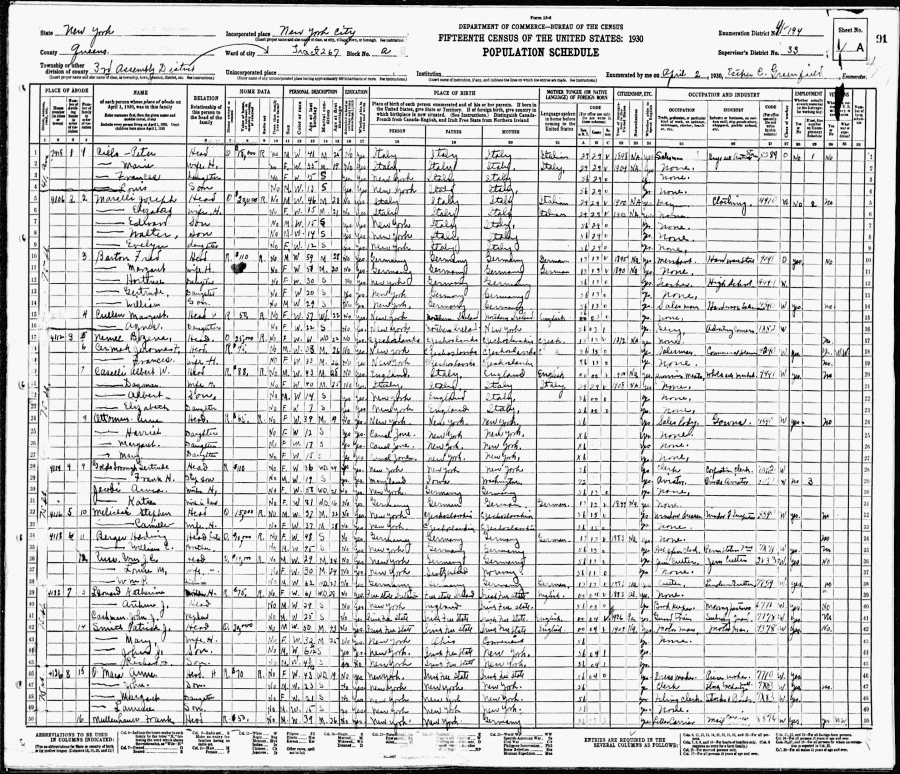Edwards: The Manipulative Motive Behind a Census Citizenship Question
July 15, 2019
In preparation for the decennial census, the Federal Government has to prepare and print more than 1.5 billion sheets of paper to be mailed out in 2020. Printing begins six months early in order to ensure that the questionnaire is ready in time. So far, it seems that the Trump administration has missed the deadline to begin printing 2020 Census, likely due to all of the controversy and confusion surrounding the proposed “citizenship question.”
For almost two years, the Trump administration has been pushing to add a question to the decennial census about citizenship, which has not been a standard question in the census since 1950. In late June, the Supreme Court issued a decision that ruled the government’s rationale behind the question to be inadequate and sent the case challenging the citizenship question back to a lower court. Since the Supreme Court’s decision, the status of a citizenship question on the 2020 Census has remained unclear because of contradictory tweets by President Trump, statements by Secretary Ross and testimony from Department of Justice lawyers.
Unfortunately, what has gotten lost in the coverage surrounding the proposed citizenship question has been the actual motivation behind the Trump administration’s efforts and the very real effects it could have on the accuracy of the 2020 census. If the Trump administration succeeds in adding a citizenship question on the decennial census, non-citizens will be undercounted and states will be denied accurate representation through congressional reapportionment.
The 14th Amendment to the U.S. Constitution requires that congressional representation within the House of Representatives is allocated according to the total population, which includes non-citizens and citizens not yet eligible to vote. The use of the total population or voting eligible population for the apportionment base are topics certainly worthy of debate. But the merits and rationale of adding a citizenship question on the 2020 Census must be analyzed through the current understanding of the United States congressional apportionment process — which is based on a count of the total population. As the apportionment process currently stands, all U.S. residents need to be counted and representation must be appropriated equally without regard to citizenship status.
In order to reapportion in harmony with constitutional guidelines, the total population must be counted as accurately as possible. According to the Census Bureau and former Bureau officials, introducing a citizenship question on the census would “inevitably jeopardize the overall accuracy of the population count” and “invariably lead to a lower response rate.” The Census Bureau’s chief scientist John Abowd has estimated that the addition of a citizenship question would cause an estimated 6.5 million people to not be counted and as a result, multiple states with high non-citizen populations — like Florida, Texas, New York, Arizona and California — may lose congressional representation, and other states with low non-citizen populations — like Montana, Ohio, Minnesota and Alabama — may gain congressional representation.
Thomas Hofeller, a “Republican redistricting guru,” authored a report in 2015 that laid out the effects a policy that would change the apportionment base to the population of citizens old enough to vote rather than the total population would have. He acknowledges that the policy “would be advantageous to Republicans and Non-Hispanic Whites” and would “be a disadvantage for the Democrats,” but that one of the substantial limitations to implementing this policy is the lack of data available on the number of non-citizens residing in the United States. He concludes that “without a question on citizenship being included on the 2020 Census questionnaire, the use of citizen voting age population is functionally unworkable.”
A couple of years later, Hofeller worked extensively with the Department of Justice during the process of adding a citizenship question to the census. One of the biggest contributions Hofeller made was his ghostwriting of the rationale for adding a citizenship question, which was found to be insufficient by SCOTUS and described by Chief Justice Roberts as “contrived.” If the citizenship question is included in the census, the estimated loss of representation is similar to the loss of representation that would occur as a result of Hofeller’s policy.
Various rationales have been used to justify a citizenship question, but it wasn’t until President Trump had a rare moment of honesty at a press avail that the government’s motive was made crystal clear: “You need it for Congress — you need it for Congress for districting … How many people are there? Are they citizens? Are they not citizens? You need it for many reasons.’”
The Trump administration’s proposed inclusion of a citizenship question on the 2020 Census is a manipulation of the apportionment and redistricting process designed by architects who aimed to increase Republican political power and undermine the total population count. By inducing decreased response rates, a citizenship question would decrease the representation given to non-citizens and increase the representation given to “Republicans and Non-Hispanic Whites.”
In recent days, President Trump has once again flip-flopped on his plans for the census, but the motivation behind the proposed citizenship question has only become clearer, and the arguments against a citizenship question have only become stronger. The Trump administration should cease its effort to include a citizenship question in the 2020 Census, not only because of the constitutional implications, but because it would render the census inaccurate and states would be denied representation during the next round of congressional reapportionment.








